310 books about Women authors and 7
start with D
310 books about Women authors and 7
310 books about Women authors
7 start with D start with D
7 start with D start with D
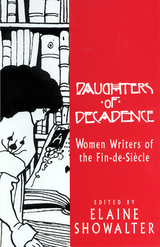
Daughters of Decadence
Women Writers of the Fin de Siecle
Showalter, Elaine
Rutgers University Press, 1993
At the turn of the century, short stories by -- and often about -- "New Women" flooded the pages English and American magazines such as the Atlantic Monthly, Harpers, and the Yellow Book. This daring new fiction, often innovative in form and courageous in its candid representations of female sexuality, marital discontent, and feminist protest, shocked Victorian critics, who denounced the authors as "literary degenerates" or "erotomaniacs." This collection brings together twenty of the most original and important stories from this period. The writers included in this highly readable volume are Kate Chopin, Victoria Cross, George Egerton, Julia Constance Fletcher, Charlotte Perkins Gilman, Sarah Grand, Vernon Lee, Ada Leverson, Charlotte Mew, Olive Schreiner, Edith Wharton, Constance Fenimore Woolson, and Mabel E. Wotton. As Elaine Showalter shows in her introduction, the short fiction of the Fin-de-Siecle is the missing link between the Golden Age of Victorian women writers and the new era of feminist modernism.
[more]
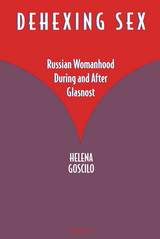
Dehexing Sex
Russian Womanhood During and After Glasnost
Helena Goscilo
University of Michigan Press, 1996
Glasnost and the collapse of the Soviet Union revolutionized Russian society. What effects, however, did they have on the status, role, and image of women in Russian culture? Examining the past turbulent decade of transition to "democracy" and a market economy, Dehexing Sex traces the ways in which Russia's concept of womanhood both changed and remained the same, taking into account dominant ideologies and social philosophies, sociopolitical organizations, women's writings, literary criticism, film, and popular cultural forms such as pornography.
The lively, engaging chapters of this book examine texts by contemporary women writers in the context of the political, social, economic, biological, psychological, and aesthetic transformations that helped define them. Goscilo reveals that the Russian cultural revolution has reshaped the female image in varied and often contradictory ways. While increased interaction with the West fostered gender awareness, it also introduced imported Western sexist practices--especially the exploitation of female bodies--formerly proscribed by a puritanical censorship. Popular magazines, newspapers, and television propagated the image of woman as mother, ornament, and sexual object, even as women's fiction conceived of womanhood in complex psychological terms that undermined the gender stereotypes which had ruled Soviet thinking for more than 70 years.
With the aid of feminist and cultural theory, Dehexing Sex investigates the overt and internalized misogyny that combined with the genuinely liberalizing forces unleashed by Gorbachev's policy of glasnost and perestroika. It exposes Russia's repressive romance with womanhood as a metaphor for nationhood and explores Russian women's ironic recasting of national mythologies.
"Impressive . . . an important contribution to Russian studies and to women's studies. The author is an outstanding scholar, an energetic and original thinker, and her writing sparkles with imagination and wit." --Stephanie Sandler, Amherst College
Helena Goscilo is Associate Professor and Chair of Slavic Languages and Literatures, University of Pittsburgh.
The lively, engaging chapters of this book examine texts by contemporary women writers in the context of the political, social, economic, biological, psychological, and aesthetic transformations that helped define them. Goscilo reveals that the Russian cultural revolution has reshaped the female image in varied and often contradictory ways. While increased interaction with the West fostered gender awareness, it also introduced imported Western sexist practices--especially the exploitation of female bodies--formerly proscribed by a puritanical censorship. Popular magazines, newspapers, and television propagated the image of woman as mother, ornament, and sexual object, even as women's fiction conceived of womanhood in complex psychological terms that undermined the gender stereotypes which had ruled Soviet thinking for more than 70 years.
With the aid of feminist and cultural theory, Dehexing Sex investigates the overt and internalized misogyny that combined with the genuinely liberalizing forces unleashed by Gorbachev's policy of glasnost and perestroika. It exposes Russia's repressive romance with womanhood as a metaphor for nationhood and explores Russian women's ironic recasting of national mythologies.
"Impressive . . . an important contribution to Russian studies and to women's studies. The author is an outstanding scholar, an energetic and original thinker, and her writing sparkles with imagination and wit." --Stephanie Sandler, Amherst College
Helena Goscilo is Associate Professor and Chair of Slavic Languages and Literatures, University of Pittsburgh.
[more]

A Desire for Women
Relational Psychoanalysis, Writing, and Relationships between Women
Juhasz, Suzanne
Rutgers University Press, 2003
This book explores women's desire for women as it is located in examples of twentieth-century British and American women's writing, including fiction, memoir, and poetry by such writers as Virginia Woolf, Vivian Gornick, Dorothy Allison, Mary Gordon, Toni Morrison, Marilyn Hacker, and Audre Lorde. Suzanne Juhasz discusses how literary writing functions to enact and negotiate a series of relationships between women: daughter-mother, mother-daughter, lesbian lover-lesbian lover, writer-reader, and reader-writer. She shows how writing is a component of interpersonal relationships and how relationships are central to the construction of personal and social identity.
Uniquely weaving together psychoanalytic, feminist, queer, and literary theory as well as memoir to examine the value and meaning of relationships between women, Juhasz explores the writings of adult daughters, mothers, and lovers to consider how language both traces and shapes the contours of experience. She emphasizes the initial bond between mother and infant as the bedrock of identity formation, a process involving love, recognition, desire, and language, and shows how that relationship serves as source and model for all future loves.
Juhasz's lucid prose unravels the meaningful yet overlooked intricacies of the relationships that inflect much of women's writing in the twentieth century.
Uniquely weaving together psychoanalytic, feminist, queer, and literary theory as well as memoir to examine the value and meaning of relationships between women, Juhasz explores the writings of adult daughters, mothers, and lovers to consider how language both traces and shapes the contours of experience. She emphasizes the initial bond between mother and infant as the bedrock of identity formation, a process involving love, recognition, desire, and language, and shows how that relationship serves as source and model for all future loves.
Juhasz's lucid prose unravels the meaningful yet overlooked intricacies of the relationships that inflect much of women's writing in the twentieth century.
[more]
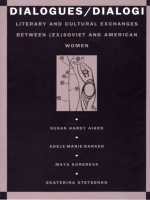
Dialogues/Dialogi
Literary and Cultural Exchanges Between (Ex)Soviet and American Women
Susan Hardy Aiken, Adele Barker, Maya Koreneva, and Ekaterina Stetsenko
Duke University Press, 1993
Co-authored by Russian, Ukrainian, and American critics, Dialogues/Dialogi is the first fully collaborative and comparative study of American and (ex)Soviet women writers. Truly a dialogue, the book juxtaposes fiction by American and Soviet women from the 1960s to the present to reveal their similarities and differences and to show how questions of gender, race, and ethnicity are enacted in the societies and psyches each text represents. Begun in the early days of glasnost and completed in 1992, the book conveys the spirit and excitement of an unprecedented critical conversation conducted during a time of historic transformation.
Dialogues/Dialogi pairs stories by Tillie Olsen, Toni Cade Bambara, Jayne Anne Phillips, and Leslie Marmon Silko (reprinted here in full) with Russian stories by I. Grekova, Liudmila Petrushevskaya, Elena Makarova, and Anna Nerkagi, many of them appearing here for the first time in English. Exquisite in their stylistic and thematic variety, suggestive of the range of women's experience and fiction in both countries, each story is the subject of paired interpretive essays by an American and an (ex)Soviet critic from among the book's authors.
A colloquy of diverse voices speaking together in multiple, mutually illuminating exchanges, Dialogues/Dialogi testifies to the possibility of evolving relationships among women across borders once considered impassable.
Dialogues/Dialogi pairs stories by Tillie Olsen, Toni Cade Bambara, Jayne Anne Phillips, and Leslie Marmon Silko (reprinted here in full) with Russian stories by I. Grekova, Liudmila Petrushevskaya, Elena Makarova, and Anna Nerkagi, many of them appearing here for the first time in English. Exquisite in their stylistic and thematic variety, suggestive of the range of women's experience and fiction in both countries, each story is the subject of paired interpretive essays by an American and an (ex)Soviet critic from among the book's authors.
A colloquy of diverse voices speaking together in multiple, mutually illuminating exchanges, Dialogues/Dialogi testifies to the possibility of evolving relationships among women across borders once considered impassable.
[more]
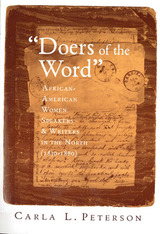
"Doers of the Word"
African-American Women Speakers and Writers in the North (1830-1880)
Peterson, Carla L
Rutgers University Press, 1998
Adapting a verse from the Epistle of James —"doers of the word"— nineteenth-century black women activists Sojourner Truth, Jarena Lee, and Frances Ellen Watkins Harper, among others, travelled throughout the Northeastern, Mid-Atlantic, and Midwestern regions of the United States. They preached, lectured, and wrote on issues of religious evangelicism, abolition, racial uplift, moral reform, temperance, and women's rights, thereby defining themselves as public intellectuals.
In situating these women within the emerging African-American urban communities of the free North, Doers of the Word provides an important counterweight to the vast scholarship on Southern slavery and argues that black "Civil Rights movements" cannot be seen as a purely modern phenomenon. In particular, the book examines the ways in which this Northern black population, despite its heterogeneity, came together and established social organizations that would facilitate community empowerment; yet Peterson's analysis also acknowledges, and seeks to explain, the highly complex relationship of black women to these institutions, a relationship that rendered their stance as public intellectuals all the more bold and defiant.
Peterson begins her study in the 1830s, when a substantial body of oratory and writing by black women first emerged, and traces the development of this writing through the shifting political climate up to the end of Reconstruction. She builds her analyses upon Foucault's interdisciplinary model of discourse with an explicitly feminist approach, drawing upon sermons, spiritual autobiographies, travel and slave narratives, journalism, essays, poetry, speeches, and fiction. From these, Peterson is able to answer several key questions. First, what empowered these women to act, to speak out, and to write? Why, and in what ways, were they marginalized within both the African-American and larger American communities? Where did they act, speak, and write from?
In situating these women within the emerging African-American urban communities of the free North, Doers of the Word provides an important counterweight to the vast scholarship on Southern slavery and argues that black "Civil Rights movements" cannot be seen as a purely modern phenomenon. In particular, the book examines the ways in which this Northern black population, despite its heterogeneity, came together and established social organizations that would facilitate community empowerment; yet Peterson's analysis also acknowledges, and seeks to explain, the highly complex relationship of black women to these institutions, a relationship that rendered their stance as public intellectuals all the more bold and defiant.
Peterson begins her study in the 1830s, when a substantial body of oratory and writing by black women first emerged, and traces the development of this writing through the shifting political climate up to the end of Reconstruction. She builds her analyses upon Foucault's interdisciplinary model of discourse with an explicitly feminist approach, drawing upon sermons, spiritual autobiographies, travel and slave narratives, journalism, essays, poetry, speeches, and fiction. From these, Peterson is able to answer several key questions. First, what empowered these women to act, to speak out, and to write? Why, and in what ways, were they marginalized within both the African-American and larger American communities? Where did they act, speak, and write from?
[more]
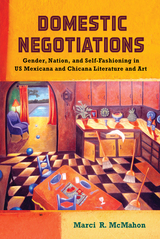
Domestic Negotiations
Gender, Nation, and Self-Fashioning in US Mexicana and Chicana Literature and Art
McMahon, Marci R
Rutgers University Press, 2013
Winner of the 2014 NACCS Tejas Non-Fiction Book Award
This interdisciplinary study explores how US Mexicana and Chicana authors and artists across different historical periods and regions use domestic space to actively claim their own histories. Through “negotiation”—a concept that accounts for artistic practices outside the duality of resistance/accommodation—and “self-fashioning,” Marci R. McMahon demonstrates how the very sites of domesticity are used to engage the many political and recurring debates about race, gender, and immigration affecting Mexicanas and Chicanas from the early twentieth century to today.
Domestic Negotiations covers a range of archival sources and cultural productions, including the self-fashioning of the “chili queens” of San Antonio, Texas, Jovita González’s romance novel Caballero, the home economics career and cookbooks of Fabiola Cabeza de Baca, Sandra Cisneros’s “purple house controversy” and her acclaimed text The House on Mango Street, Patssi Valdez’s self-fashioning and performance of domestic space in Asco and as a solo artist, Diane Rodríguez’s performance of domesticity in Hollywood television and direction of domestic roles in theater, and Alma López’s digital prints of domestic labor in Los Angeles. With intimate close readings, McMahon shows how Mexicanas and Chicanas shape domestic space to construct identities outside of gendered, racialized, and xenophobic rhetoric.
This interdisciplinary study explores how US Mexicana and Chicana authors and artists across different historical periods and regions use domestic space to actively claim their own histories. Through “negotiation”—a concept that accounts for artistic practices outside the duality of resistance/accommodation—and “self-fashioning,” Marci R. McMahon demonstrates how the very sites of domesticity are used to engage the many political and recurring debates about race, gender, and immigration affecting Mexicanas and Chicanas from the early twentieth century to today.
Domestic Negotiations covers a range of archival sources and cultural productions, including the self-fashioning of the “chili queens” of San Antonio, Texas, Jovita González’s romance novel Caballero, the home economics career and cookbooks of Fabiola Cabeza de Baca, Sandra Cisneros’s “purple house controversy” and her acclaimed text The House on Mango Street, Patssi Valdez’s self-fashioning and performance of domestic space in Asco and as a solo artist, Diane Rodríguez’s performance of domesticity in Hollywood television and direction of domestic roles in theater, and Alma López’s digital prints of domestic labor in Los Angeles. With intimate close readings, McMahon shows how Mexicanas and Chicanas shape domestic space to construct identities outside of gendered, racialized, and xenophobic rhetoric.
[more]
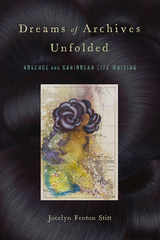
Dreams of Archives Unfolded
Absence and Caribbean Life Writing
Jocelyn Fenton Stitt
Rutgers University Press, 2021
The first book on pan-Caribbean life writing, Dreams of Archives Unfolded reveals the innovative formal practices used to write about historical absences within contemporary personal narratives. Although the premier genres of writing postcoloniality in the Caribbean have been understood to be fiction and poetry, established figures such as Erna Brodber, Maryse Condé, Lorna Goodison, Edwidge Danticat, Saidiya Hartmann, Ruth Behar, and Dionne Brand and emerging writers such as Yvonne Shorter Brown, and Gaiutra Bahadur use life writing to question the relationship between the past and the present. Stitt theorizes that the remarkable flowering of life writing by Caribbean women since 2000 is not an imitation of the “memoir boom” in North America and Europe; instead, it marks a different use of the genre born out of encountering gendered absences in archives and ancestral memory that cannot be filled with more research. Dreams of Archives makes a significant contribution to studies of Caribbean literature by demonstrating that women’s autobiographical narratives published in the past twenty years are feminist epistemological projects that rework Caribbean studies’ longstanding commitment to creating counter-archives.
[more]
READERS
Browse our collection.
PUBLISHERS
See BiblioVault's publisher services.
STUDENT SERVICES
Files for college accessibility offices.
UChicago Accessibility Resources
home | accessibility | search | about | contact us
BiblioVault ® 2001 - 2024
The University of Chicago Press









